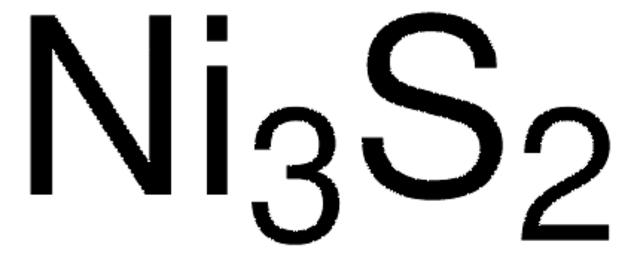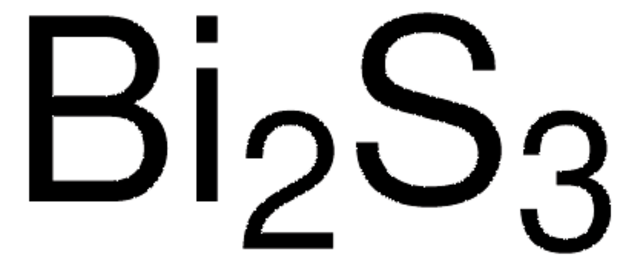342467
Copper(II) sulfide
powder, −100 mesh, ≥99% trace metals basis
Synonym(s):
Copper Blue, Copper monosulfide, Cupric sulfide, Horace Vernet′s Blue
Sign Into View Organizational & Contract Pricing
All Photos(3)
About This Item
Empirical Formula (Hill Notation):
CuS
CAS Number:
Molecular Weight:
95.61
EC Number:
MDL number:
UNSPSC Code:
12352300
PubChem Substance ID:
NACRES:
NA.23
Recommended Products
Quality Level
Assay
≥99% trace metals basis
form
powder
particle size
−100 mesh
mp
220 °C (dec.) (lit.)
density
4.6 g/mL at 25 °C (lit.)
application(s)
battery manufacturing
SMILES string
S=[Cu]
InChI
1S/Cu.S
InChI key
BWFPGXWASODCHM-UHFFFAOYSA-N
Looking for similar products? Visit Product Comparison Guide
General description
Cu63 NMR, X ray photoelectron spectroscopy,2 copper sulfide CuS was studied in detail.
Packaging
Packaged in glass bottles
Storage Class Code
11 - Combustible Solids
WGK
WGK 3
Flash Point(F)
Not applicable
Flash Point(C)
Not applicable
Personal Protective Equipment
dust mask type N95 (US), Eyeshields, Gloves
Choose from one of the most recent versions:
Already Own This Product?
Find documentation for the products that you have recently purchased in the Document Library.
Nirupam Banerjee et al.
Dalton transactions (Cambridge, England : 2003), 39(41), 9789-9793 (2010-09-11)
Well uniform microspheres of phase pure Covellite were synthesized through a simple hydrothermal approach using poly vinyl pyrrolidone (PVP) as surfactant. The micro-spheres were constituted of numerous self-organized knitted nano-ribbons of ∼ 30 nm thickness. The effect of conc. PVP
Mrinmoyee Basu et al.
Environmental science & technology, 44(16), 6313-6318 (2010-08-14)
Blue solution of copper(II) acetylacetonate complex, [Cu(acac)(2)] in dichloromethane (DCM) and an aqueous alkaline solution of thioacetamide (TAA) constitute a biphasic system. The system in a screw cap test tube under a modified hydrothermal (MHT) reaction condition produces a greenish
Hydrophilic flower-like CuS superstructures as an efficient 980 nm laser-driven photothermal agent for ablation of cancer cells.
Qiwei Tian et al.
Advanced materials (Deerfield Beach, Fla.), 23(31), 3542-3547 (2011-07-08)
Caifeng Ding et al.
Biosensors & bioelectronics, 25(5), 1082-1087 (2009-10-27)
An ultrasensitive chemiluminescence method based on the Au nanoparticles amplification for the quantitative detection of single-nucleotide polymorphisms (SNPs) in genomic DNA was accomplished by the DNA polymerase I (Klenow fragment)-induced coupling of the nucleotide-modified nanoparticle probe to the mutant sites
K Pedersen
Journal of applied microbiology, 108(3), 1094-1104 (2009-12-18)
To investigate the relationships between sulfate-reducing bacteria (SRB), growth conditions, bentonite densities and copper sulfide generation under circumstances relevant to underground, high-level radioactive waste repositories. Experiments took place 450 m underground, connected under in situ pressure to groundwater containing SRB.
Our team of scientists has experience in all areas of research including Life Science, Material Science, Chemical Synthesis, Chromatography, Analytical and many others.
Contact Technical Service







